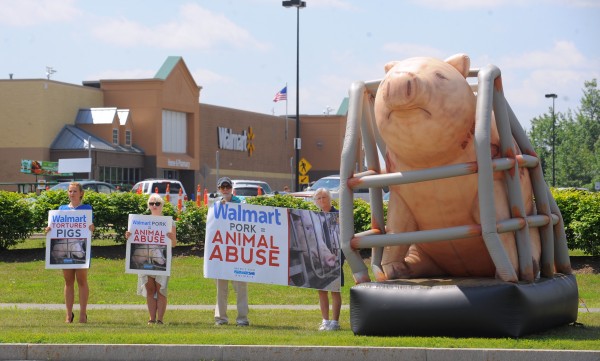
Your Pig Almost Certainly Came from a Factory Farm, No Matter What Anyone Tells You
People who eat animals increasingly care about the way their food was treated while it lived. When the American Farm Bureau, representing large-scale agribusiness interests, funded a study to gauge just how much, its researchers found that virtually all Americans — 95 percent of us, to be exact — believe animals on farms deserve proper care.
In response, instead of grappling with consumer concerns, the pork industry is scrambling to convince people that its animals were raised and slaughtered humanely by targeting the language used to describe its cruelty, rather than the cruelty itself.
July 16, 2014 | Source: Bangor Daily News | by Matthew Prescott
People who eat animals increasingly care about the way their food was treated while it lived. When the American Farm Bureau, representing large-scale agribusiness interests, funded a study to gauge just how much, its researchers found that virtually all Americans — 95 percent of us, to be exact — believe animals on farms deserve proper care. Another, by the food industry analytics firm Technomic, found that to American restaurant patrons, concerns about animal cruelty outweigh those regarding the environment, fair trade, local sourcing and many other top-of-mind issues. And the numbers are up: EggIndustry magazine (what, don’t subscribe?) recently reported how people are “much more concerned about how humanely animals are raised and handled than they were a few years ago.”
The buying public is so disturbed by what’s happening on farms that, “in the case of animal welfare,” writes the World Bank, “failure to keep pace with changing consumer expectations and market opportunities could put companies and their investors at a competitive disadvantage.”
In response, instead of grappling with consumer concerns, the pork industry is scrambling to convince people that its animals were raised and slaughtered humanely by targeting the language used to describe its cruelty, rather than the cruelty itself. One vocal Minnesota pork producer laments: “If there is one term I am most frustrated with hearing people say, it is factory farms.” The Animal Agriculture Alliance, an industry public relations firm, insists that “factory farm” is “a catchy phrase created by the strategic public relations teams of the activist community.” The group complains that advocacy organizations use the term “factory farming” to portray pork and other products “as just another commodity coming off the assembly line with no thought given to safety or the health and wellbeing of workers and animals.”
This would be funny if it didn’t require rewriting a lot of history in which factory farms openly focused on efficiency above all else — allowing animal mistreatment for the sake of the bottom of line.
